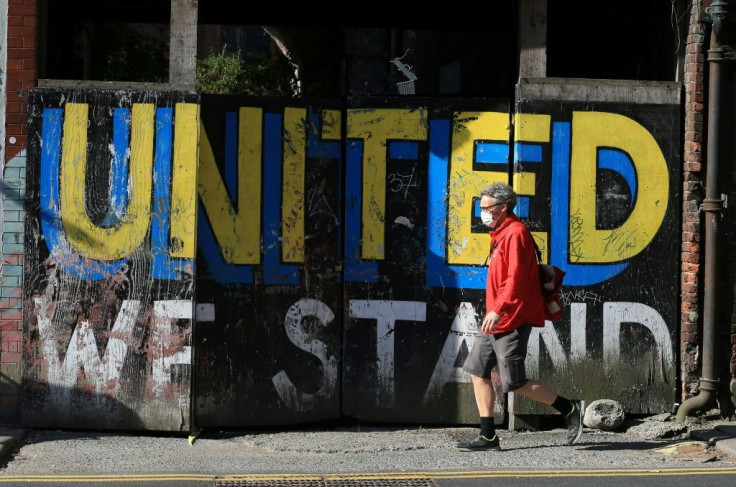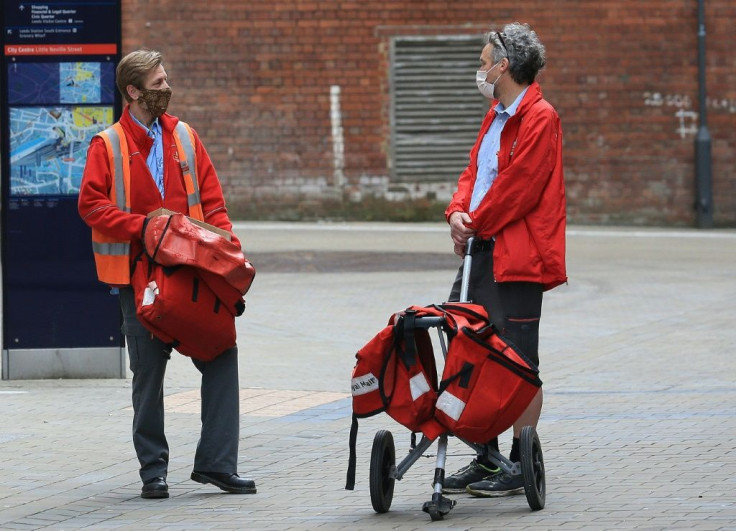Postal Staff Put Stamp On UK Outbreak

"It's been like Christmas," said one Royal Mail postal worker of the surge in parcels delivered across the city of St Albans during the coronavirus pandemic -- a situation repeated across Britain.
The bulk of the population continues to work remotely and shop online despite Britain's easing lockdown, resulting in the former state-run company helping the likes of Amazon to fulfil orders.
However, the large jump in packages has not been enough to offset a slump in the company's core letters business as Britons use social media to keep in touch -- a factor behind the sudden departure last month of chief executive Rico Back.
While Royal Mail staff delivered 308 million fewer letters in the five weeks to May 3, down 33 percent on a year earlier, parcel deliveries jumped 31 percent.
Back's exit after less than two years in the role came after union bosses accused the company of being slow to provide protective equipment such as masks, gloves and sanitiser to workers.
Communication Workers Union (CWU) official Vinnie Micallef said that after Back "totally lost his workforce", much has "settled down" under Royal Mail's interim head Keith Williams, a former British Airways chief executive.
"We're hopeful that we can stabilise the company again and any changes that need to be made can be done together," Micallef told AFP.
Born more than 500 years ago, Royal Mail has experienced some of its most turbulent times during the past decade, notably its controversial privatisation in 2013.
Its attempts to modernise in the internet age have led to many battles with unions.
Late last year, the company won a High Court injunction to block strike action during the busy pre-Christmas period.
More recently, unions feared that by temporarily cutting Saturday deliveries to ease the burden on staff during the pandemic, Back wanted to permanently reduce Royal Mail's cherished six-days-a-week service.
The CWU claims such a change could cost 20,000 jobs, or around 12 percent of the company's workforce.

Royal Mail employees are in no doubt however about enjoying elevated status with the UK public thanks to their key role in delivering virus test-kits and helping businesses to survive the economic fallout.
London postal worker Sahir Saeed, who had to self-isolate for 14 days at his family's home after his father caught the virus, said households are offering him plenty of food and drink while out on his rounds.
"Customers appreciate what we've been going through," he told AFP.
"The overall response has been really, really good. We do feel really appreciated and loved. We've been delivering COVID test-kits and medical supplies to people that have been in isolation."
Saeed said that just before the UK lockdown began on March 23, almost 40 percent of his sorting office was off work, either sick or in isolation.
He said while it "had a big impact on deliveries", workloads continue to be affected by social distancing, such as only one worker being allowed in each of Royal Mail's distinctive red vans.
"Keeping the nation connected in these unprecedented times is of vital importance to us," said Shane O'Riordain, managing director of marketing at Royal Mail.
"It is perhaps unsurprising that for many customers, receiving an item that they have ordered online from our postmen and postwomen can really brighten up their day in such challenging times."
Thanks to socially-distanced chats, postal workers are also getting to know customers now working from home.
Some Royal Mail staff are even dressing up as superheroes during their rounds, while others are voluntarily delivering hot meals to people left housebound by the virus.
As well as offering gifts, customers are taking to social media to show their appreciation.
"Thank you. You've helped keep my small business going!" tweeted Sally.
© Copyright AFP {{Year}}. All rights reserved.





















